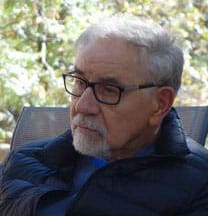Rabbi Gershom Sizomu, the first black sub-Saharan rabbi ordained at an American rabbinical school, has had a very busy time since returning to Uganda in June, after not having lived there for five years. Among other activities, the American Jewish University graduate recently supervised about 250 formal conversions to Judaism: men, women and children, ages ranging from 4 to 80, who had been preparing while he was gone for their meeting with the beit din.
“We started the conversions on July 8,” said Sizomu, who spoke with The Journal by cellphone from his Ugandan village. “And we have continued the conversions throughout the week. People not just from Uganda, but also from Kenya, South Africa and from Ghana.
“We are very happy about how Judaism appeals to Africans,” he continued. “We are not going out there and asking people to convert. We are here, and people come to us and express their desire to make that commitment, their desire to immerse themselves in Jewish education.”
The African converts also immersed themselves in nature’s mikvah.
“The mikvah was the river,” Sizomu said. “So the women went to one part of the river, and the men went to a different part. It was so beautiful.”
The mass conversions were not the only major event for Sizomu since returning to Uganda. During the same week, he hosted the first-ever meeting of PAJA, the Pan-African Jewish Alliance.
“Jewish community leaders [came] from black African communities in Nigeria, Kenya, Ghana and Ethiopia,” Sizomu said.
The idea for this gathering arose during a think tank session at Be’chol Lashon (In Every Tongue), a donation-driven, nonprofit organization headquartered in San Francisco. According to its Web site, Be’chol Lashon’s mission is to increase the number of Jews throughout the world by advocating for “a more expansive Judaism.”
“Instead of hand-wringing about our losses from intermarriage or low birth rate,” said Diane Tobin, Be’chol Lashon’s director, “we advocate for a different attitude and approach, which is to promote growth and inclusiveness. We’re partners with Jewish communities in Africa and around the globe. We believe that the potential for the growth of Jewish communities is significant … in countries that many may not think about when it comes to the Jewish people.”
It was Be’chol Lashon that subsidized Sizomu’s years of study at rabbinical school.
“We first met Gershom Sizomu over six years ago,” Tobin said, “and we decided to provide him with a fellowship to complete his formal rabbinic training, in cooperation with the American Jewish University. His purpose was our purpose, also, for Rabbi Sizomu to go back to Uganda and live out his dream of growing Judaism in Uganda and other parts of Africa.”
Perhaps one of the reasons that Judaism is increasing in Uganda is that, according to Tobin, the 39-year-old Sizomu, under the auspices of Be’chol Lashon, has been instrumental in improving the quality of life in his village and in nearby villages, as well.
“While he was at rabbinical school,” Tobin said, “Gershom worked tirelessly to bring life-saving services and equipment to his country and his community. He believes that there can be no true spiritual life without those elements that preserve life and prevent disease. An enormous problem in his part of the world is malaria, and he’s been very active in bringing in mosquito nets, as well as medicine.”
Now that he’s returned home, Sizomu can see the fruits of his — and Be’chol Lashon’s — efforts. His village now has running water and electricity, services that will soon be available in neighboring villages, as well. Sizomu said that “there are very good changes that have taken place in these villages. We are making very good progress.”
If there was culture shock for Sizomu, his wife and their daughters when they left their Ugandan village five years ago and moved to an apartment in Bel Air, it was nearly as much of a shock to come back to their village filled with mud-hut dwellings.
“Living in Los Angeles,” Sizomu said, “my family became used to the conveniences of modern life: washing machine, cable television, high-speed Internet, so many conveniences. In the U.S., if you want something, you go straight to the counter and get what you want. Things here in Uganda are much slower. It’s harder to get things done here. And there is a lot that needs to be done. But we are making progress every day.”
Sizomu — now the busy spiritual leader of his community — said that since coming back home, he’s had little time to reflect on what he misses about the United States.
“I feel that I gained a lot while living in Los Angeles,” Sizomu said, “and now I can give that back to my people in terms of teaching Torah and community leadership. For me, the best part about returning here has been to see how eager the people are to learn about Judaism and to be Jewish.
“Five years ago, when I left this village, I knew I’d be back some day. And I knew that my return would be very special … and it has been.”

Did you enjoy this article?
You'll love our roundtable.
Editor's Picks



What Ever Happened to the LA Times?

Who Are the Jews On Joe Biden’s Cabinet?


No Labels: The Group Fighting for the Political Center
Latest Articles

NSFW – A Poem for Parsha Metzora

Israel War Room Launches in Spanish

Modern Book Bans Echo Past Atrocities and Further Silence Marginalized Voices

The Power of the Passover Seder to Unite Jews

Dr. Nicole Saphier Reflects on Motherhood and Jewish Advocacy












 More news and opinions than at a Shabbat dinner, right in your inbox.
More news and opinions than at a Shabbat dinner, right in your inbox.